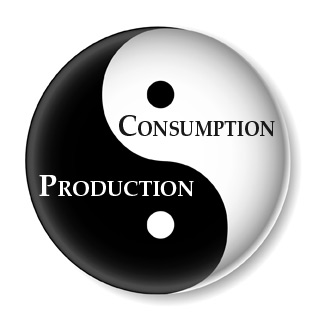Izielen Agbon

Nigeria is a consuming nation. We are not a producing nation. We export raw materials produced largely by foreign firms and import processed goods to meet most of our daily needs. This has been the foundation of our economy since the Europeans landed on our shores. The fundamental economic, political and social relations of Nigeria are relations of underdevelopment designed to reproduce the nation on an expanded scale as a neocolonial nation. These power relations are managed by a regressive anti-development native ruling class whose primal function is the looting of the public treasury for private benefits. The slogan to move Nigeria from consumption to production has gain prominence in this bourgeois election cycle.
Moving from consumption to production means different things to different people. From the point of view of the Nigerian ruling class and Foreign Capital, moving from consumption to production means more surplus value, more profits, more cheap raw materials, more cheap labour, more alienating work, more rent seeking opportunities and better access to loot public funds. The ruling class would like to see the labouring classes consume less and produce more. It does not matter that 133 million of us live in multi-dimensional poverty. On the other hand, the perspective of the Nigerian labouring classes is different. From the point of view of the labouring classes, moving from consumption to production means more wealth, less alienating work, more disposable time, a better life for ourselves and our children, and the organization of Nigerian society around a multiplicity of self-determined activities. It means the implementation of labour friendly policies, strategies and programs aimed at ensuring balanced integrated sustainable development in major economic sectors. Let us examine what moving from consumption to production means in the agricultural, industrial, and oil and gas sectors.
From the perspective of the labouring classes, moving from consumption to production in the agricultural sector means we grow what we eat and eat what we grow. We process all our agricultural products and add value to them before export. We implement grassroots friendly policies, strategies and programs. The strategy for agricultural development is centred on the mechanization of agricultural production and the processing of agricultural products. This strategy is based on increasing productivity by increasing output per acre and output per man hour for smallholder farmers through advanced crop science and the mechanization of agricultural production. Agricultural collectives and cooperatives are organized to pursue medium and large scale agriculture on communal lands rather than the large scale privatization of communal lands and turning land owning small farmers into landless rural hourly waged workers. Large scale privatization of communal lands is resulting in massive rural urban migration and very high rural urban unemployment. Agricultural export crops are processed in agriculture based rural industries and value added before export. We implement small farmer friendly policies, strategies and programs in the sector. The agrarian policies prioritize the production of the means of subsistence and ensure self sufficiency in food and livestock production.
From a grassroots perspective, moving from consumption to production in the industrial sector means we implement a planned and balanced rapid diversification and industrialization of the national economy. We produce most of the raw materials that we use. We process all our raw materials in our factories and add value to our products before export. We stop the export of primary products and the import of foreign processed goods. We produce most of the processed goods we need locally. We produce our national means of production and the machinery necessary for the processing of our agricultural produce. The Nigerian state owns the means of production in key industries. The State respects all labour laws and honours all labour agreements. We implement workers friendly policies, strategies and programs in the sector. The strategy for a diversified planned and balanced rapid industrial growth links the industrial sector to the agricultural sector with the production of modern machinery/tools for mass agricultural production and the industrial processing of agricultural products for domestic sales and export. This strategy promotes balanced integrated growth between the industrial and agricultural sectors.
From a grassroots perspective, moving from consumption to production in the oil sector means we stop the importation of petroleum products and encourage the domestic refining of our crude oil to meet our domestic needs. We diversify our economy by producing and refining all our crude oil and exporting surplus petroleum products after meeting our national demand. We repair all our existing refineries, construct new ones (conventional and modular) and produce all the petroleum products needed to meet our national demand locally. Temporary swap deals are only done with local Nigerian private owned refineries. The oil and gas development strategy is based on ensuring self sufficiency in petroleum products production. We terminate the importation of petroleum products. We base the pricing of petroleum products on a production cost pricing model (as per other oil producing nations) rather than an import parity pricing model as demanded by the IMF. The use of a production cost pricing model eliminates the need for fuel subsidy and provides the affordable power and energy needed for the rapid industrialization of Nigeria. We protect all our pipelines and stop oil theft.
We need to move Nigeria from consumption to production understood from perspective of the labouring classes. The strategies, policies and programs governing this movement must be directed at meeting the sustainable development interests of the labouring classes and the masses of our people. We must fight for strategies, policies and programs that move consumption to production from our perspective. Nobody will fight for us. We have to fight for our own liberation. The future of own children and the sustainable development of our nation depend on it.






